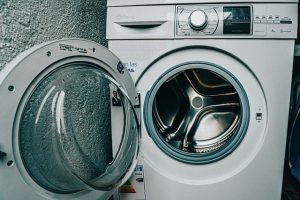How to Prevent Mold From Getting into Appliances
 Everyone loves shiny, brand new appliances. Somehow, chores feel easier when you have a clean washing machine or dishwasher. However, that’s not always the case. Unfortunately, your home appliances are also susceptible to mold growth, the fuzzy, fungal growth that begins to form wherever there is moisture and humidity.
Everyone loves shiny, brand new appliances. Somehow, chores feel easier when you have a clean washing machine or dishwasher. However, that’s not always the case. Unfortunately, your home appliances are also susceptible to mold growth, the fuzzy, fungal growth that begins to form wherever there is moisture and humidity.
When you consider how mold grows, it’s easy to understand why laundry rooms, bathrooms and kitchens are especially vulnerable to mold. Mold can occur practically anywhere, as long as there is moisture. Mold spores can begin to form within just 48 hours, so you need to act fast to prevent mold growth in your appliances.
Appliances Most Susceptible to Mold
Now that we know what causes mold to grow, let’s talk about which appliances in your home can potentially be a breeding ground for mold and why. This helps you take preventative measures to save your appliances and dodge costly repairs and replacements.
Refrigerator
This is a no-brainer! The lack of ventilation and presence of moisture in refrigerators means that they can fall prey to mold. This would usually happen at the back of the appliance, so you should make sure you check it regularly. Not only can mold ruin an appliance, but it can also pose a serious health risk to inhabitants.
Washing Machine
Washing machines feature an air tight design, which creates the perfect humid and moist environment for mold to grow and thrive. Check the front-load washer and the top-load washer for mold growth before you are alerted by that strong, musty odor!
Humidifier
Humidifiers are known for increasing moisture levels in the environment. So when humidity levels are high, mold will begin to form very quickly. This would be extremely dangerous as a humidifier with mold will begin to release toxins in the air that you and your family breathe, causing a host of respiratory diseases.
Air Conditioner
Air vents can also see mold growth if the AC is not properly cleaned or use. Mold could begin to form during winter season when air conditioners are not in use. While you may peer inside vents to spot ml growth, you’ll do a better job by just asking a mold removal company to check this for you.
Hot Water Heater
A water heater may be tucked away in the corner of a utility room, and mold growth in it would go ignored. Mold may begin to form in water heaters as a result of a loose drain valve. When moisture collects at the bottom of the heater, mold will quickly begin to form.
How to Prevent Mold from Getting in Appliances?
Now that you know which appliances are most vulnerable to mold, we’ll look at some tips to prevent mold growth in appliances.
1. Ensure Ventilation in Washing Machines
Open the door of the washing machine after a laundry session. This will ensure ventilation and also get rid of the humidity building up inside, which creates the perfect breeding ground for mold. Make sure you also wipe the surface to get rid of the lingering moisture.
2. Clean Grime
Build-up of grime in washing machines attracts mold growth, so make sure to take care of that. You can prevent mold growth by regular inspections of the door creases and detergent dispensers. You can also follow the washing machine manufacturer’s tips for keeping the appliance clean and free of mold.
3. Clean Food Stains and Spills From Refrigerators
It is common that you may drop some food on the refrigerator as you’re taking something out. If you forget to clean it, the food may harden. Mold will quickly begin to form on it as it feeds on organic material. To prevent this, you should wipe any food spills and stains on your refrigerator.
4. Wipe the Trays with Hydrogen Peroxide Once a Month
Every month, take out the ice trays, the drawers and containers from your refrigerator and thoroughly clean everything. Moisture is ever present inside refrigerators and contrary to popular belief, mold can form in low temperatures too. Use hydrogen peroxide or vinegar to wipe these compartments and trays to prevent mold growth.
5. Make Sure Appliances are Dry After Use
Another important tip to prevent mold growth that applies on all appliances is to ensure they are dry after use. This includes washing machines, dishwashers and even the refrigerator compartments that you cleaned. Mold thrives in the presence of moisture, so prevent mold growth by keeping appliances dry.
6. Inspect Water Heater for Leaks
If you want to prevent mold growth in your hot water heater and the areas surrounding it, you should regularly check it for leaks. You should get these leaks fixed immediately or act fast and replace the heater altogether.
911 Restoration of Marietta
No matter how hard you try, mold can be inevitable in homes sometimes. But when mold begins to grow in your appliances, it becomes a real hassle. If you are facing water damage or mold damage in homes, you should contact 911 Restoration of Marietta. The water damage team will conduct a visual inspection of your home and spot mold damage that needs to be treated before it gets to your appliances.


